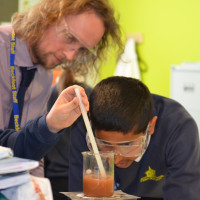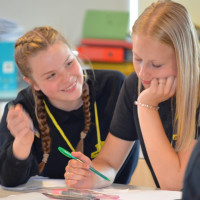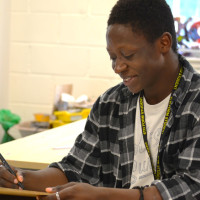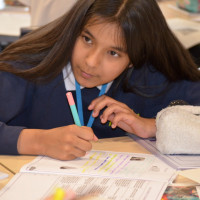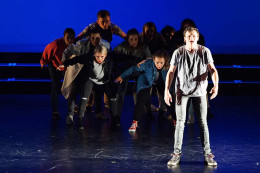Drama & Theatre
Download our Drama and Theatre prospectus here
The intent of Drama and Theatre at Beckfoot is to nurture enjoyment and understanding of the Performing Arts, through practical experience. We aim to develop subject specific and transferable skills, that challenge and empowers students, building their confidence by fostering a creative approach to express themselves and their opinions on the world around them. Teamwork, creativity, communication and reflection are at the heart of every lesson. Our subject gives students the opportunity to explore themes and issues deeply – looking at/from alternative view points.
Why choose Drama A Level?
A-level Drama and Theatre Studies is for students who enjoy reading and watching plays, and taking part in them, whether performing, directing or designing sets and costumes. It offers students the freedom to choose both the content and the form of their performances.



Why should I choose it?
- Students have creative and interpretative freedom
- It is gives students inspiration and critical and practical skills for other subjects they may be studying
- Students can attend any live theatre production for the written paper and bring their experiences into class
- Written papers add rigour to the course and help ensure that students understand the way plays relate to their historical, social and cultural context
- Students develop confidence, team-building, communication and other life skills
- The work of significant theatrical practitioners is considered and that students understand the connection between theory and practice.
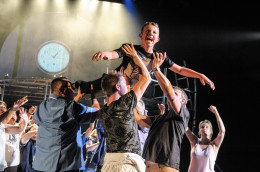

What do students like about A-level Drama and Theatre Studies?
- The group work is at the heart of this course
- You study a range of plays
- Being able to go to any live theatre productions to prepare for the written paper
- Having the skills to analyse and appreciate any drama or theatre
- The opportunity to devise original work
- Being able to consider work by influential playwrights, directors and theatre companies
- Developing skills that could help them in many different careers.
Skills students develop on this course
This specification will help students to develop their:
- Knowledge and understanding of a range of practical drama skills including:
- acting
- directing
- costume
- set designing
- mask-making
- technical design
- Collaborative skills with others to present a performance piece
- Communication skills
- Understanding of the major theatrical styles
- Performance techniques – interpretation, voice, physicality, stage relationships with others
- Design skills – interpretation, visual and design impacts and set creation
- Technical abilities – lighting and sound design, special effects, technology and appropriate equipment
- Practical skills – from making masks and building sets to creation of period style and make-up
- Confidence, team-building, communication and other life skills.
Drama and Theatre FAQs
1. What styles of theatre do we perform?
We begin the course exploring a range of practitioners and theatre companies to give you an idea of the different styles you could choose from.
The course is very student led; therefore, you are then free to choose which style you want to work in for each of your performances. Each performance must be influenced by a different practitioner or theatre company.
2. Will we go on any theatre trips?
Viewing live theatre is an essential part of the course. We will organise at least three theatre trips each year, which will be chosen to expand and deepen your knowledge of the styles you are performing in components 1 and 2 or studying for component 3.
3. How much coursework is involved?
- In component 1 your practical process is supported by a Creative Log which can be presented visually / audibly (7-10 mins) or written (1500 words).
- In component 2, you will be required to write a process and evaluation report (3000 words maximum).
4. What do you write about in the written exam?
Section A will ask you short questions about the interpretation of the characters, vocal and physical skills, the structure and language in the plays and the design elements (sound, set, lighting etc...).
Section B will be an essay question asking about the context of the play, the influence of the play and how it could be adapted for a contemporary (modern) audience.
Section C will ask you about how the extract could be performed in the theatre. You will be thinking about different types of stages, character positioning, design elements and how seeing other live pieces of theatre has influenced your decision.
5. Should I choose Drama A-level even if I don’t want to work in the theatre?
Absolutely! Through doing this course, you will develop a variety of skills which are essential for any career:
Creative, teamwork, analytical, presentation, confidence, writing, planning, interpersonal, technical and communication skills are all highly desirable skills for any future study or employment.
Who to contact to find out more about this subject at A-Level:
Emily Kyle – Assistant Faculty Leader for Creativity.
Email address: becemt@beckfoot.org


